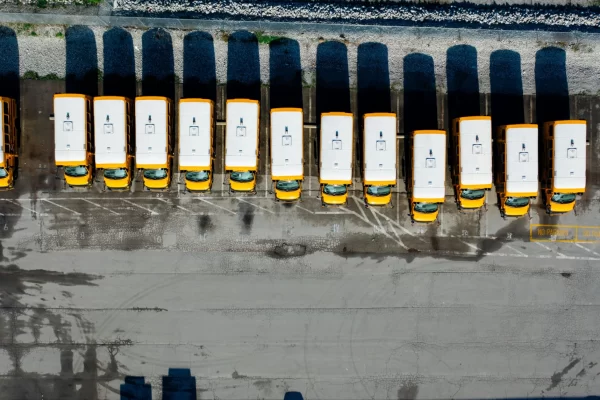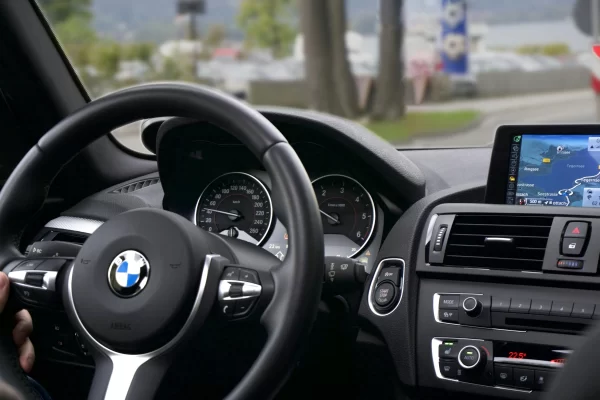As dashcams become more and more popular in the fleet management space, managers are frequently confused about laws and regulations, especially when concerning privacy laws for both employees and customers. Before we dive into the legality of dash cams in each state, it’s important to note that there is no federal law that governs their use. Instead, each state has its own laws and regulations that dictate whether dash cams are legal and what restrictions may apply.
While dash cams are legal in every state, certain restrictions apply when it comes to how they are mounted and recording consent in all-party consent states. We typically refer to these as common-sense laws around things like mounting position and size of the camera. While they vary slightly in most states, the prevailing theme is simply to not obstruct the driver’s view while not explicitly providing any restrictions on location. Certain states, which we will explore below do place restrictions on mounting and privacy of passengers.
Alabama: Your dash cams must not be mounted on the driver’s windshield, as it’s illegal to block any of the view. You can record footage in public places, but it’s illegal to record footage while trespassing on private property. You should ask for consent before recording on private property. If your dash cams record audio, you must get consent from everyone in the vehicle (including your employees and your customers) before recording their voices.
Arkansas: It is legal to use dash cams, but it’s illegal to obstruct your windshield with any non-transparent objects (including dash cams!). You can’t mount your dash cam on the windshield, side wings, or side or rear windows. Mounting your dash cams on dashboards or behind rearview mirrors is fine.
California: Dash cams are legal in California as long as they do not obstruct the driver’s view and do not record audio inside the vehicle without the consent of all parties involved. Dash cams must not be mounted in any space an airbag may deploy, think side curtain airbags, etc…
Delaware: Your dash cams must not be mounted on the driver’s windshield, as it’s illegal to block any of the views. You can record footage in public places, but it’s illegal to record footage while trespassing on private property. You should ask for consent before recording on private property. If your dash cams record audio, you must get consent from everyone in the vehicle (including your employees and your customers) before recording their voices.
Florida: It is legal to use dash cams, but It’s illegal to drive a vehicle if something’s obstructing the view of the road – in other words, your dash cams must be mounted in a position where they don’t block the view out the windshield. Either on your dashboard or behind the rearview mirror is a safe place. If your dash cams record audio, you must get consent from everyone in the vehicle (including your employees and your customers) before recording their voices.
Illinois: Dash cam cannot block more than five square inches of the windshield from view. If your dash cams record audio, you must get consent from everyone in the vehicle (including your employees and your customers) before recording their voices.
Illinois has strict penalties for anyone caught recording police activity in public. This is something to be aware of when driving near police officers.
Maryland: In Maryland, it’s legal to use dash cams as long as you follow a couple of rules, including some very specific guidance about where you can mount them. Dash cams must be installed above the AS-1 line of a vehicle’s windshield, or within five inches of the top of the windshield, and no lower. Alternatively, dash cams can be installed in the bottom corner of the windshield, as long as they fit within a seven-inch square. If your dash cams record audio, you must get consent from everyone in the vehicle (including your employees and your customers) before recording their voices.
Massachusetts: Dash cams are legal in Massachusetts, but there are laws to be aware of. It’s illegal to place a non-transparent object on the windshield, so mount your dash cams on the dashboard or behind the rear-view mirror instead. You can record events that take place in public places, but not those that happen on private property. You should ask for consent before recording on private property. If your dash cams record audio, you must get consent from everyone in the vehicle (including your employees and your customers) before recording their voices.
Michigan: It’s illegal to mount your dash cams on windshields as it can obstruct the driver’s view of the road, so fit them on dashboards or behind rear view mirrors instead. That said, this law doesn’t apply to buses, truck tractors, or trucks that weigh over 10,000 pounds or carry hazardous waste. If you manage these kinds of vehicles, you can place your cams wherever you like! If your dash cams record audio, you must get consent from everyone in the vehicle (including your employees and your customers) before recording their voices.
Minnesota: Dash cams are legal in Minnesota, but you don’t have much choice over where you can mount them. You can only fit your cams immediately behind, slightly above, or slightly below rear-view mirrors. A dash cam mounted in any other position, including on the dashboard (which is a good spot in most other states!), is considered illegal.
Montana: It’s legal to use dash cams in Montana, but there are rules to comply with. Windshields need to stay completely unobstructed in Montana, so don’t mount your dash cams on windshields – even if your cameras are transparent! The dashboard is the safest spot for them in this state. You can record footage in public places, but not on private property. You should ask for consent before recording on private property. If your dash cams record audio, you must make sure everyone in your vehicle is aware they’re being recorded. It’s legal to record conversations without consent, as long as it’s not done covertly.
Nebraska: You can’t mount your dash cams directly on windshields, as this can obstruct the driver’s view of the road. Instead, the safest place to install them in Nebraska is on the dashboard. If your dash cams record audio, you must get consent from everyone in the vehicle (including your employees and your customers) before recording their voices.
New Hampshire: Dash cams are legal in New Hampshire, but there are a couple of regulations to know: It’s illegal to mount your dash cams on your vehicles’ front windshields, so opt for installing them on the dashboard instead. If your dash cams record audio, you must get consent from everyone in the vehicle (including your employees and your customers) before recording their voices.
Oregon: It’s illegal to install your dash cams up on windshields or windows, as the law prohibits “any material that prevents or impairs the ability to see into or out of the vehicle”. Mounting your cams on your drivers’ dashboards is the best thing to do in Oregon. If your dash cams record audio, you must get consent from everyone in the vehicle (including your employees and your customers) before recording their voices.
Pennsylvania: It’s illegal to mount your dash cams on your drivers’ windows or windshields, so stick to installing them on dashboards. Dash cam screens shouldn’t distract your drivers, so invest in devices that don’t have screens, or have screens that can be put to sleep. If your dash cams record audio, you must get consent from everyone in the vehicle (including your employees and your customers) before recording their voices.
Washington: It’s illegal to mount your dash cams on your drivers’ windshields as they could obstruct the view of the road, so install them on their dashboards instead. If your dash cams record audio, you must get consent from everyone in the vehicle (including your employees and your customers) before recording their voices.
In summary, a few things to be aware of when implementing dash cameras for your fleet. First, when it comes to audio recording you have two options. While you can place a warning sticker in every vehicle that states audio recording is in use, the best option in most cases is to simply disable all audio recording, after all, you need to see what happened on the road, not hear it. Another thing many fleet managers must consider is vehicles that may travel between states, especially when it comes to OTR long haul. While the laws vary slightly, the main things to consider involve obstruction of the windshield and recording audio. By adhering to as many common-sense measures as possible you can be sure to be compliant in almost any situation. Keep in mind that while this article offers a landscape of current dash cam laws, the legal landscape is ever-changing. If you have specific concerns about dashcam usage in your state, it is always best to check with local law enforcement for any current regulations. As a company, Traxxis GPS Solutions works to stay up to date on all local regulations and is happy to assist with any questions you may have.
Please note that the information provided in this blog is for informational purposes only and should not be construed as legal advice. This blog does not create an attorney-client relationship, and any reliance on the information provided is at your own risk. The advice offered here is not legally binding, and we strongly advise you to consult with a qualified attorney and/or local law enforcement in your state for specific legal advice regarding your situation.
| State | Audio Recording | Windshield Mount |
| Alabama | NO | YES |
| Alaska | YES | YES |
| Arizona | YES | YES |
| Arkansas | YES | NO |
| California | NO | YES |
| Colorado | YES | YES |
| Connecticut | YES | YES |
| Delaware | NO | NO |
| Florida | NO | YES |
| Georgia | YES | YES |
| Hawaii | YES | YES |
| Idaho | YES | YES |
| Illinois | NO | YES |
| Indiana | YES | YES |
| Iowa | YES | YES |
| Kansas | YES | YES |
| Kentucky | YES | YES |
| Louisiana | YES | YES |
| Maine | YES | YES |
| Maryland | NO | YES |
| Massachusetts | NO | NO |
| Michigan | NO | YES |
| Minnesota | YES | YES |
| Mississippi | YES | YES |
| Missouri | YES | YES |
| Montana | NO | NO |
| Nebraska | NO | NO |
| Nevada | YES | YES |
| New Hampshire | NO | NO |
| New Jersey | YES | YES |
| New Mexico | YES | YES |
| New York | YES | YES |
| North Carolina | YES | YES |
| North Dakota | YES | YES |
| Ohio | YES | YES |
| Oklahoma | YES | YES |
| Oregon | NO | NO |
| Pennsylvania | NO | NO |
| Rhode Island | YES | YES |
| South Carolina | YES | YES |
| South Dakota | YES | YES |
| Tennessee | YES | YES |
| Texas | YES | YES |
| Utah | YES | YES |
| Vermont | YES | YES |
| Virginia | YES | YES |
| Washington | NO | NO |
| West Virginia | YES | YES |
| Wisconsin | YES | YES |
| Wyoming | YES | YES |
Visit Traxxis GPS for more information.





